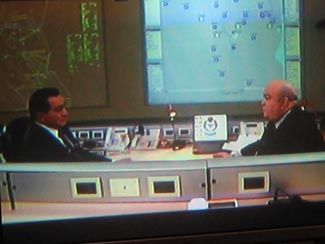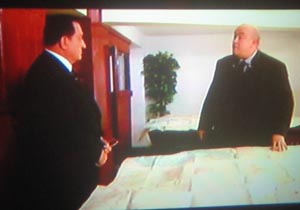The Trilogy - Episode 2


Last night's second installment of "My Word for History" was more of the same. The good news was it was only 90 minutes (rather than 120). So there was some mercy on those of us watching. I am actually not as hacked off as others are watching the series. Naturally, parts are absurd and way over the top, but it is fascinating watching and listening to Mubarak's thoughts about himself. He exudes authority in a way that whoever succeeds him will unlikely be able to do. This is not because of not wanting to but simply because even now it feels out of touch.
Mubarak is definitely old school and as far as I can tell with the new generation of leaders in most of the other Arab countries, it is like having a window in on another era that will one day disappear. Ah shucks, it is just the romantic in me.
Adib was, again, pretty weak. He acts amazed when the president says anything and he loves to preface questions with little annoying bits such as "Your Excellency, I really hope you don't get upset at me but...". It would be fine if a real question came but it is usually like "How did you develop your kindhearted firmness?" So Adib is just lobbing them over the plate as Mubarak knocks them out of the park.
So what were the revelations of last nights show?
Well - for better or worse the interview again stayed firmly within the 1973 war for the first 70 minutes. They left the command center at one point and went to the map room. Even though Adib claimed "I am not going to understand because I am not a specialist on such things," he pressed on and listened more intently than I did.
____
Mubarak's claims last night:
-He has the Egyptian landscape completely memorized from his days of flying jets over it.
- Sadat was never the sole negotiator with the Americans. Hence, the military high command (Ismail, al-Shazly, Fahmy, Gamasy, and Mubarak) played a large role in talks with the US. "Without the military, it would have been an illogical" move to negotiate on one's own. Mubarak emphasized Sadat did not interfere with our military planning. He would listen and make a decision based off the military high command's analysis.
-The armed forces are the shield of the country and no armies will ever have bases in Egypt despite occasionally coordinating maneuvers with foreign armies.
-He kept referring to Egyptians as "my people" which rather text book from certain branches of social science theory.
__________
Following all this, there was one question that Adib was able to ask that was relatively hard-ball. He said to Mubarak, "In America, George Bush has to interact with other branches of government that can 'balance' his power. Does any branch balance your power?"
Intrigued, everyone watching in my flat sat at attention. Mubarak said that of course there are powers that check him. He then gave an explicit example about in 1990 when Iraq invaded Kuwait. He argued that there was a defense pact with other Arab governments but instead of acting unilaterally, he went to parliament to seek their consent (which they gave). Then he said, "MPs give me permission."
_____
The remainder of the interview talked about his appointment as VP by Sadat in 1975. Mubarak explained that he harbored no political ambitions. But he thought potentially being an ambassador or envoy to a Western country would have been a nice change of pace from his hectic time in the military. He said all he had seen was wars and destruction and as the course of peace lined up, he thought a career change to something a little less demanding would be a pleasant.
As fate had it, Sadat called him in for a three hour meeting where he informed Mubarak that he was appointing a VP from the October generation. Mubarak suggested all the other generals names, but Sadat brushed them aside in favor of him.
When Sadat offered him, Mubarak claims he was in shock and surprised. He never expected to be appointed in his wildest dreams. He went home and told his wife who was also shocked. His sons, Alaa and Gamal, were not in favor. They did not want their father leaving the air force.
He mulled it over and decided that although he felt he needed a change of speed that duty to the nation called. Against the wishes of his family, he began a new page in his life. Yet, his service in the military prepared him for his political life. As he explains, "Not anyone can be a leader. It needs training and not everyone who is trained can be a leader." Adib told him he was a leader and Mubarak said he is still shy when praised. It was an emotional moment.
Mubarak argued that he was a very serious VP. He was always honest with Sadat and then talked extensively his mediation in Arab affairs. He spoke about brokering some land dispute between Algeria and Morocco. Now, my ignorance is on the table - I did not know anything about this but it happened.
This episode concluded with some discussion of decision-making and how one must listen and ponder before taking a decision.
__________________________
It ended and then programming shot to a gala celebrating Sinai Liberation day. As the song played the patriot tune "Today Egypt is in Festival" (Masr al-Yom fi -`eid) me and my fellow watchers looked at the TV waiting.
One of my more astute friends looked up and said, "Right...Mubarak has been president of the Arab world's largest country for 24 years. We are three and a half hours into these interviews and he is yet to mention or be questioned on a single event that has occurred while he is president. What does that mean?"
___________________________
The advertisements on Egyptian TV plugging this series is interesting. It talks about how unprecedented this is and how a surprise is coming. The camera shoots to Adib who asks "Are you running for president?" and then it tells you to tune in.
After the episode ended, we were hanging on my balcony and an informal consensus surfaced that one option we had not considered may actually be in the offering this evening.
Adib: "Your Excellency, Are you running for president?"
Mubarak: "I cannot answer that now. We have to see if the people wish it."
___
More Tomorrow
